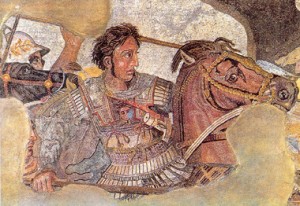Our relationship with the horse predates literacy, but both tomb relics and modern records agree that most of history’s leading societies possessed the highest skill in horsemanship. Clearly there is more to a horse than meets the eye.
Equestrian skill was important for prowess in battle, and advantage could be attained by advances in horse care, riding, training, breeding, equipment, etc. The horse represented potential for producing enormous gains in productivity, and societies best at tapping that potential were the most successful.
One of the earliest civilizations, the Hittites, were a society known for their ability in building and using chariots, and grew to dominance in the 18th Century BC. Hittites were bested by Egyptians who used a new, lighter chariot design in the Battle of Kadesh in 1274, which was an epic Ancient World clash involving an estimated 5,000 chariots.
The Egyptians were eclipsed by the Greeks, and a superior philosophy of horsemanship may well have played a role. The Greek general Xenophon wrote On Horsemanship, the earliest surviving work on empathetic riding we now call dressage, which explains the humane method of schooling which produced their victorious cavalry.
Horsemanship fell to brutality in the Dark Ages, a symptom of a weakness the equine-centered Mongolian tribes under Genghis Khan were able to exploit as they overran Europe, India and the Middle East in the 13th century with huge armies of light horses.
Xenophon’s “On Horsemanship” was re-discovered in the 1400’s and helped ignite an interest in Classical thought which led to the Renaissance. 15th century Spaniards romanticized riding and treated it as an art form—a revolution of ideas from the brute servitude of Middle Age mounts—and their superior horsemanship was marked with triumph in the age of Conquistadors.
The 16th century Riding Master Pluvinel helped France take the lead in the equestrian arts with the development of the Haute Ecole, or High School of dressage, and the famous Airs Above the Ground. Today the contest continues in the form of international equestrian sport, where success still serves as a metaphor for a nation’s predominance.
